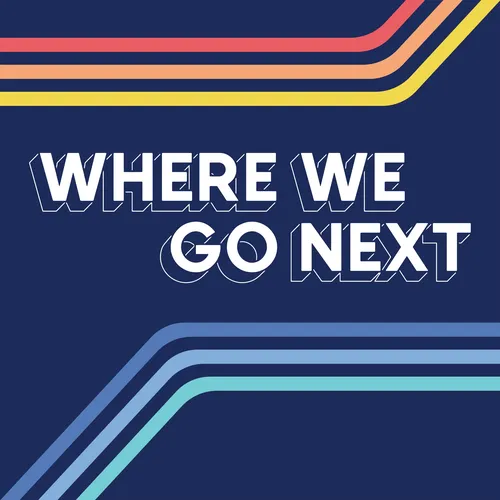
Where We Go Next
Not the usual questions. Not the usual answers. Where We Go Next is a podcast focused on in-depth conversations with the people changing the ways we think, create, and live.
- Update frequency
- every 11 days
- Average duration
- 71 minutes
- Episodes
- 140
- Years Active
- 2020 - 2025

20: The New Science of Self-Actualization, with Scott Barry Kaufman
Social distancing has separated us from the ones we care about, and cut us off from the day-to-day lives we've so long known. The mental and emotional toll of this prolonged isolation has been excruc…

19: Finding Commonality Across the "Racial Divide," with Rahmaan Mwongozi
Society has got you figured out: they talk about you like they know you, like you're part of a collective. They take a group, and pair it with either an adjective or a noun. "White this." "Black that…

18: The Struggle to Define Liberalism in the 21st Century, with Jay Shapiro
Why does nothing seem to make sense, anymore? Why do all of our important words seem so slippery, and our definitions ever harder to define? What is a liberal? What really is a conservative? And what…

17: The Conservative Case for Solving Climate Change, with Quill Robinson
Climate change is a pressing issue that requires both our attention and our action. But why does so much of modern environmental activism seem to come from one side of the aisle? The American Conserv…

16: A Compassionate Approach to Anti-Racism Training, with Chloé Valdary
Racism is real. Its devastating historical effects can still be felt today, and the misguided and harmful beliefs that we've inherited from previous generations can have a profound impact on how we s…

15: The Complicated Story of America, with Razib Khan
America isn't just a geographical location, or a mass of 330 million people living within a set of lines drawn on a map. America is the story it tells itself about itself. And adding new chapters fee…

14: Patriotism Shouldn’t Be Partisan, with Siddak Ahuja
Why is patriotism increasingly a partisan issue, divided by party affiliation? Writer Siddak Ahuja has some theories on why certain political demographics are less patriotic than others.

13: Nuclear Energy Can Save the World, with Nick Touran
When we talk about ways to combat climate change and address our nation's energy needs, we consistently leave the safest, most reliable, and most efficient energy source out of the discussion altoget…

12: How Tragedy Can Lead to Growth, with Ayishat Akanbi
When we talk about the "culture wars" - issues of identity, race, ethnicity, immigration, gender, sex, sexuality - we often don't fully understand why exactly we believe the things we believe. Fashio…

11: Being Polite Can Hinder Moral Progress, with Alexandra Hudson
What if I told you that sometimes, being polite does more harm than good? That the niceties we use to grease the wheels of our daily interactions can actually hurt the very people we want to help, an…

10: The Merits of a Modern Montessori Education, with Ray Girn & Matt Bateman
Our national conversation around childhood education usually revolves around or devolves into a sort of generic bifurcation of public vs private. But only when we really break a topic down into its c…

9: The Widening Gap Between the Wealthy and Working Classes, with Rob Henderson
The working and wealthy classes in America are further apart than they've been in 60 years. Wages, wealth generation, savings - these are the obvious ones, but marriage stability and self-reported ra…

8: The Complexities and Contradictions Within Racial "Communities," with Brittany Talissa King
If you were tasked with summing up the worldview of 50 million people, could you do it? Sounds a little ridiculous, right? Well, there are just about 50 million people in the "Black Community" in the…

7: Challenging the Ethics of ”Cancel Culture,” with Angel Eduardo
If you've ever stopped yourself from saying something that you know is pretty innocuous, then you've experienced the chilling effect of a phenomenon known as "cancel culture." But what can happen whe…

6: Every News Story Is a Kind of Fiction, with Shaun Cammack
Humans are natural-born story machines. And those stories - those narratives - can help bring us closer together, or push us further apart. Today is Election Day, and we seem more divided than we hav…

5: The Inherent Value of Lived Experiences, with Roderick Graham
When we discuss groups of people, we often speak in terms of data - polls, graphs, percentages - and while this can offer us insight on the macro level, it leaves a lot of valuable, relevant informat…

4: Racial Nationalism Is a Really Dumb Idea, with Wilfred Reilly
What if America were split into racialized ethnostates? A “White” country and a “Black” one? Would we all be better off? Writer and HBCU professor Wilfred Reilly explains why racial nationalism is a …

3: A Challenge to Move Beyond Racialized Identities, with Inaya Folarin Iman
Skin color is real, but what we call “race” - the way we categorize and limit people based on their appearance - is a fiction. Are we stuck with this falsehood forever? British journalist and televis…

2: Expanding What It Means to Be American, with Zaid Jilani
As America continues to become more racially and ethnically diverse, and our concept of what it means to be American changes, how do we widen our tribe while maintaining a common narrative? Journalis…

1: How to Bridge Political Divides, with John Wood, Jr.
When it comes to the political, it's not unusual to agree to disagree. But when our modern discourse so often feels toxic, how can we be more agreeable in our disagreement? John Wood, Jr. of Braver A…